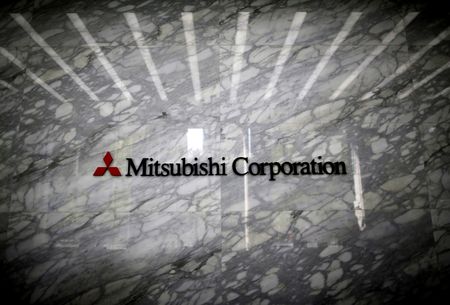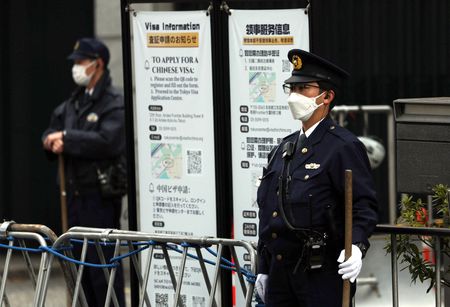By Yuka Obayashi and Katya Golubkova
TOKYO (Reuters) -Mitsubishi Corp on Monday said it is reviewing how to proceed with its offshore wind projects in Japan given a “significantly changed” business environment, showing that the country is not immune to rising costs across offshore wind projects globally.
Japan, which imports nearly everything for its energy needs, has bet on renewable energy to raise its energy security and decarbonise the economy by 2050.
Mitsubishi leads consortia that won Japan’s first state-run offshore wind auctions in 2021.
The government started to auction sites for future offshore wind farms – of which Japan wants to have 10 gigawatt (GW) by 2030 and 45 GW by 2040 – only in 2020.
A year later, consortia led by Mitsubishi were selected to operate three projects in the Akita prefecture in the north and the Chiba prefecture to the east of Tokyo with total projected capacity of 1.76 GW and a target start-up of 2028 to 2030.
“We will consider the appropriate next steps after thoroughly examining the results of our review,” Mitsubishi said in a statement, without providing other details.
Mitsubishi is “essentially threatening” to walk away from their projects, hinting that it needs more support and putting the government in a very awkward position, said Yuriy Humber, CEO of K.K. Yuri Group, a Tokyo-based research and consulting firm.
“But if the government helps, other past auction winners and future bidders will have to assume that bids can be re-negotiated. It also begs the question around how much the state should compensate for global macro risks,” he said by email.
Officials at Japan’s industry ministry’s section which oversees wind power generation were not immediately available for a comment.
So far, Japan has held three offshore wind auctions, with winners including western companies RWE, Iberdrola and BP. Last week, the government relaxed some of the auction rules to address soaring costs.
Chubu Electric Power Co, whose unit C-Tech partners with Mitsubishi in all three projects won in 2021, said on Monday that it was re-evaluating the feasibility of its offshore wind projects, including exploring measures to improve profitability.
Chubu Electric posted a 18 billion yen ($116 million) loss on the three Mitsubishi-led offshore wind projects in the April-December period due to rising construction costs amid inflation, yen depreciation, tight supply chains, rising interest rates and other factors.
Overall, its net profit for the period was at 167.2 billion yen, down 53% from a year ago.
“The biggest concern is whether there will be a large scaling back or withdrawal of these projects,” said Mika Ohbayashi, director at Renewable Energy Institute in Tokyo.
“Such revisions should be avoided at all costs, especially considering the potential impact on local economies, other developers, and investors.”
($1 = 155.5200 yen)
(Reporting by Yuka Obayashi, Chang-Ran Kim and Katya Golubkova; Editing by Savio D’Souza, Sherry Jacob-Phillips and Mrigank Dhaniwala)











